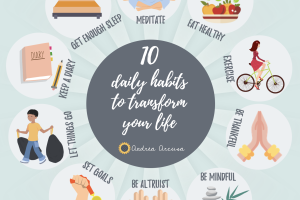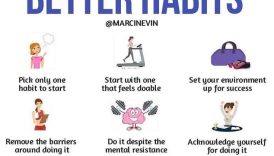10 Healthy Habits to Transform Your Life for the Better

Introduction to Healthy Habits
Understanding the Importance of Healthy Habits
Adopting healthy habits is not just a trend; it’s a lifestyle choice that can significantly enhance one’s quality of life. Just like cars need regular maintenance to perform well, our bodies require consistent care to function optimally. Imagine a time when you chose to skip meals or ignore your sleep schedule—how did that make you feel? Engaging in healthy habits fosters:
- 10 Healthy Habits to Transform Your Life for the Better
- Introduction to Healthy Habits
- Understanding the Importance of Healthy Habits
- Benefits of Incorporating Healthy Habits into Your Life
- Establishing a Balanced Diet
- Importance of Nutrition in Transforming Your Life
- Tips for Eating a Balanced Diet
- Regular Exercise Routine
- Impact of Exercise on Overall Health
- Ways to Develop a Consistent Exercise Routine
- Prioritizing Mental Health
- Strategies for Stress Management
- Importance of Self-Care Practices
- Getting Sufficient Sleep
- Effects of Sleep on Physical and Mental Well-being
- Tips for Improving Sleep Quality
- Hydration and Its Benefits
- Importance of Staying Hydrated
- Ways to Ensure an Adequate Water Intake
- Practicing Mindfulness and Meditation
- Benefits of Mindfulness on Mental Health
- How to Incorporate Meditation into Your Daily Routine
- Building Strong Relationships
- Impact of Relationships on Overall Well-being
- Tips for Nurturing Healthy Relationships
- Setting Realistic Goals
- Importance of Goal Setting for Personal Growth
- Strategies for Achieving Your Goals
- Incorporating Physical Activity into Daily Life
- Benefits of Being Active Throughout the Day
- Simple Ways to Increase Physical Activity
- Cultivating a Positive Mindset
- Effects of Positivity on Overall Health
- Techniques for Maintaining a Positive Outlook
- XII. Limiting Screen Time
- Negative Effects of Excessive Screen Time
- Tips for Reducing Screen Time
- XIII. Embracing Regular Medical Check-ups
- Importance of Preventive Healthcare
- Key Health Screenings to Consider
- XIV. Practicing Gratitude Daily
- Benefits of Gratitude on Mental Well-being
- Ways to Cultivate a Grateful Mindset
- XV. Celebrating Small Victories
- Importance of Recognizing Achievements
- Creating a System to Acknowledge Progress
- Better physical health
- Improved mental clarity
- Enhanced emotional resilience
Benefits of Incorporating Healthy Habits into Your Life
Integrating healthy habits into daily routines can lead to transformative benefits. These include:
- Increased Energy Levels: Regular exercise and a balanced diet can leave you feeling more vibrant.
- Enhanced Mood: Activities like meditation can lead to reduced stress and an uplifted spirit.
- Long-term Health: Healthy habits contribute to disease prevention and promote longevity.
By making small, manageable changes, anyone can experience the positive effects of living a healthier lifestyle. It’s about progress, not perfection!
Establishing a Balanced Diet
Importance of Nutrition in Transforming Your Life
Nutrition plays a pivotal role in shaping our overall well-being. Think about the last time you fueled your body with nutritious food—didn’t it feel empowering? A well-balanced diet can transform not only your physical health but also your mental sharpness and emotional balance. Proper nutrition helps to:
- Support immune function
- Promote healthy weight management
- Enhance mood and cognitive performance
It’s like providing high-quality fuel for a race car; it performs better, lasts longer, and handles challenges effortlessly.
Tips for Eating a Balanced Diet
To cultivate a balanced diet, consider these practical tips:
- Prioritize Whole Foods: Embrace fruits, vegetables, whole grains, lean proteins, and healthy fats.
- Practice Portion Control: Pay attention to serving sizes to avoid overeating.
- Stay Hydrated: Drink plenty of water throughout the day.
- Plan Your Meals: Prepare a weekly meal plan to ensure you’ve got healthy options ready.
By making small adjustments in dietary choices, you can embark on a fulfilling journey towards better nutrition and a healthier life.
Regular Exercise Routine
Impact of Exercise on Overall Health
Engaging in regular exercise is one of the most crucial steps you can take towards achieving optimal health. Remember that exhilarating rush after a good workout? That’s not just endorphins; it’s your body thanking you! Exercise delivers a range of benefits, including:
- Improved Cardiovascular Health: Keeps your heart strong and reduces the risk of diseases.
- Enhanced Mood: Regular activity can help combat anxiety and depression.
- Better Sleep Quality: Increases the likelihood of restful sleep, leaving you refreshed.
Integrating movement into your life can transform both your physical and mental states.
Ways to Develop a Consistent Exercise Routine
Building a consistent exercise routine might seem daunting, but it can be approached quite simply:
- Set Clear Goals: Establish short-term and long-term fitness objectives to keep you motivated.
- Find Activities You Enjoy: Whether it’s dancing, hiking, or yoga, choose exercises that bring you joy.
- Schedule It In: Treat your workout like an important meeting—make it a non-negotiable part of your day.
- Start Small: If you’re new to exercise, begin with just 15-20 minutes a day and gradually increase.
With these strategies, consistency becomes easier, and you’ll enjoy the rewards of a healthier lifestyle.
Prioritizing Mental Health
Strategies for Stress Management
As crucial as physical fitness is, mental well-being deserves equal attention. Can you recall a time when stress overwhelmed you? It’s essential to have effective strategies for managing that stress. Techniques such as:
- Mindful Breathing: Take a few deep breaths, inhaling through your nose and exhaling through your mouth, to calm your mind.
- Regular Breaks: Step away from work or busy schedules—even a short walk can make a difference.
- Journaling: Writing down your thoughts and feelings can provide clarity and reduce anxiety.
Implementing these practices can significantly reduce stress levels and foster emotional resilience.
Importance of Self-Care Practices
Self-care is not a luxury; it’s a necessity for maintaining our mental health. When was the last time you did something just for you? Engaging in self-care can recharge your energy and boost your mood. Some beneficial self-care practices include:
- Establishing Boundaries: Learn to say no when necessary, allowing you to recharge.
- Pursuing Hobbies: Spend time doing activities you love, whether it’s painting, gardening, or reading.
- Seeking Professional Help: Don’t hesitate to talk to a therapist or counselor when needed.
By prioritizing self-care, you actively nurture a healthier, more balanced state of mind.
Getting Sufficient Sleep
Effects of Sleep on Physical and Mental Well-being
Just like a smartphone needs charging, our bodies require sleep to function at their best. Have you ever experienced fatigue after a restless night? The effects of insufficient sleep extend far beyond feeling groggy; they can impact physical and mental well-being significantly. Quality sleep helps to:
- Regulate Emotions: Adequate rest plays a vital role in managing anxiety and depression.
- Boost Immune Function: A well-rested body is better equipped to fight infections and illness.
- Enhance Cognitive Function: Sleep improves focus and memory, making daily tasks easier.
Prioritizing sleep is essential for overall health.
Tips for Improving Sleep Quality
Improving sleep quality can be simpler than it seems. Here are some practical tips:
- Establish a Routine: Go to bed and wake up at the same time daily to regulate your body clock.
- Create a Restful Environment: Make your bedroom dark, cool, and quiet to encourage relaxation.
- Limit Screen Time: Reduce exposure to screens at least an hour before bed, as blue light can disrupt sleep.
- Practice Relaxation Techniques: Consider reading, stretching, or meditating to wind down.
By incorporating these strategies, you can enhance your sleep quality and wake up feeling rejuvenated each day.
Hydration and Its Benefits
Importance of Staying Hydrated
As we shift our focus towards hydration, it’s essential to recognize just how critical staying hydrated is for overall well-being. Have you ever felt sluggish or had difficulty concentrating? Dehydration might be the culprit. Proper hydration supports:
- Physical Performance: Staying hydrated helps maintain energy levels during workouts.
- Cognitive Function: Adequate water intake can improve concentration and memory.
- Skin Health: Hydration keeps your skin looking vibrant and helps reduce signs of aging.
Drinking enough water can be a game-changer for both physical and mental vitality.
Ways to Ensure an Adequate Water Intake
Making sure you drink enough water is easier than it sounds. Here are some helpful strategies:
- Carry a Reusable Water Bottle: Keeping water on hand encourages regular sipping throughout the day.
- Set Reminders: Use apps or alarms that remind you to drink water at intervals.
- Infuse Your Water: Add slices of fruits like lemon, cucumber, or berries for an enjoyable twist.
- Eat Water-Rich Foods: Incorporate fruits and vegetables such as cucumbers, oranges, and strawberries, which naturally contain water.
By integrating these simple practices into your daily routine, you can effortlessly meet your hydration needs and enjoy the benefits that come with it.
Practicing Mindfulness and Meditation
Benefits of Mindfulness on Mental Health
As we continue our journey towards holistic well-being, it’s time to explore the transformative power of mindfulness and meditation. Have you ever found yourself overwhelmed by daily stressors? Practicing mindfulness can provide a sanctuary of peace amidst chaos. Some of its benefits include:
- Reduced Anxiety: Mindfulness techniques help in lowering anxiety levels and promoting feelings of calm.
- Enhanced Focus: Regular practice improves concentration, making daily tasks more manageable.
- Emotional Regulation: Mindfulness fosters greater awareness of emotions, aiding in healthier responses.
Embracing mindfulness can significantly uplift your mental health.
How to Incorporate Meditation into Your Daily Routine
Integrating meditation into your daily routine can be surprisingly simple. Here are some practical tips to start:
- Dedicate a Specific Time: Choose a consistent time each day—perhaps in the morning or before bed—to practice meditation.
- Start Small: Begin with just 5-10 minutes a day, gradually increasing the duration as you become more comfortable.
- Find a Comfortable Space: Designate a quiet spot at home where you can sit comfortably without distractions.
- Use Guided Meditations: Consider apps or online videos to guide you through initial sessions.
By incorporating mindfulness and meditation into your life, you can cultivate a profound sense of peace and enhance your overall well-being.
Building Strong Relationships
Impact of Relationships on Overall Well-being
As we delve deeper into well-being, it’s important to acknowledge the significant role relationships play in our lives. Have you ever felt uplifted after spending quality time with loved ones? Positive relationships can dramatically enhance your emotional and physical health. They contribute to:
- Emotional Support: Strong connections provide a safety net during challenging times.
- Reduced Stress: Being around supportive people can lower stress levels and feelings of loneliness.
- Increased Happiness: Engaging with loved ones fosters joy and fulfillment in life.
Fostering healthy relationships is thus paramount for overall well-being.
Tips for Nurturing Healthy Relationships
Building and maintaining strong relationships takes effort, but the rewards are immense. Here are some actionable tips:
- Communicate Openly: Share your thoughts and feelings honestly to avoid misunderstandings.
- Make Time for Each Other: Prioritize quality time, whether it’s a casual coffee catch-up or a planned outing.
- Show Appreciation: Small gestures, like saying “thank you” or complimenting someone, go a long way in strengthening bonds.
- Be Supportive: Be there for your friends and family, offering a listening ear or a helping hand when needed.
By nurturing these connections, you can cultivate a fulfilling network of relationships that enhance your overall happiness and health.
Setting Realistic Goals
Importance of Goal Setting for Personal Growth
As we cultivate strong relationships, it’s essential to turn our focus inward towards personal growth, and setting realistic goals is a powerful step in that direction. Have you ever felt the rush of achievement when you accomplish a set target? Goals provide direction and motivation, helping to clarify what you truly want in life. They play a crucial role in:
- Enhancing Motivation: Clear goals can ignite your passion and drive.
- Building Confidence: Achieving smaller goals can boost your self-esteem and encourage you to tackle bigger challenges.
- Encouraging Accountability: Sharing your goals with others keeps you committed to your path.
Setting realistic goals paves the way for personal development.
Strategies for Achieving Your Goals
To effectively work towards your goals, consider these strategies:
- Define SMART Goals: Ensure your goals are Specific, Measurable, Achievable, Relevant, and Time-bound.
- Break It Down: Divide larger goals into smaller, manageable steps to prevent feeling overwhelmed.
- Track Progress: Regularly monitor your advancements to stay motivated and adjust as needed.
- Celebrate Milestones: Acknowledge and reward yourself for each achievement, no matter how small.
By employing these strategies, you can navigate your journey toward personal growth with purpose and confidence.
Incorporating Physical Activity into Daily Life
Benefits of Being Active Throughout the Day
As we set realistic goals for personal growth, it’s essential to recognize the role of physical activity in enhancing our lives. Have you ever noticed how a simple walk can elevate your mood? Integrating movement throughout your day can lead to:
- Improved Energy Levels: Staying active boosts your energy, allowing you to tackle tasks more effectively.
- Enhanced Mood: Regular movement releases endorphins, which can combat feelings of stress and anxiety.
- Better Overall Health: Maintaining physical activity aids in weight management and reduces the risk of chronic diseases.
These benefits showcase the importance of finding ways to stay active daily.
Simple Ways to Increase Physical Activity
Incorporating more movement doesn’t require drastic changes. Here are some easy strategies to get started:
- Take the Stairs: Opt for stairs instead of elevators to squeeze in some cardio.
- Walk During Breaks: Use your breaks at work to take short walks to refresh both body and mind.
- Park Further Away: If you use a car, park a bit farther from your destination to add extra steps.
- Join a Group Activity: Participating in a club or class can make exercise more enjoyable and motivate you to stay active.
By implementing these simple changes, you can effortlessly weave physical activity into your daily routine and enjoy its myriad benefits.
Cultivating a Positive Mindset
Effects of Positivity on Overall Health
As we embrace physical activity in our daily lives, it’s equally important to focus on cultivating a positive mindset. Have you ever noticed how a bright perspective can change your entire day? A positive mindset profoundly impacts overall health by:
- Reducing Stress Levels: Positivity can create resilience against stressors, leading to a calmer state of mind.
- Boosting Immunity: Studies suggest that an optimistic outlook can enhance your immune system’s function.
- Improving Relationships: A positive demeanor attracts others, fostering better connections and support systems.
Such benefits highlight the power of positivity in enhancing life quality.
Techniques for Maintaining a Positive Outlook
To sustain a positive mindset, consider incorporating these effective techniques into your routine:
- Practice Gratitude: Sharing daily what you’re thankful for can shift your focus to the positive aspects of life.
- Engage in Affirmations: Use positive affirmations to counter negative self-talk and build confidence.
- Limit Negative Influences: Reduce exposure to pessimistic people or media that drain your energy.
- Surround Yourself with Positivity: Engage with uplifting content, whether it’s books, podcasts, or inspiring friends.
By integrating these strategies, you can maintain a positive outlook and enhance your overall well-being.
XII. Limiting Screen Time
Negative Effects of Excessive Screen Time
As we continue to foster a positive mindset, it’s critical to recognize the negative effects of excessive screen time. Have you ever felt drained after binge-watching your favorite series? Too much screen exposure can lead to:
- Increased Eye Strain: Staring at screens for long periods can cause discomfort and fatigue.
- Sleep Disruptions: Blue light emitted by screens interferes with sleep patterns, leading to insomnia.
- Reduced Physical Activity: Extended screen time often correlates with a more sedentary lifestyle, negatively affecting overall health.
Understanding these impacts can motivate a healthier approach to screen usage.
Tips for Reducing Screen Time
To strike a balance and limit screen time, consider these actionable tips:
- Set Specific Limits: Allocate certain times of the day for screen usage and stick to them.
- Engage in Alternative Activities: Discover hobbies or interests that don’t involve screens, like reading or outdoor activities.
- Create Tech-Free Zones: Designate areas in your home, like the dining room or bedroom, as no-screen zones.
- Use Apps for Monitoring: Employ applications that track and limit your screen time, making it easier to stay accountable.
By implementing these strategies, you can reclaim valuable time, enhance physical activity, and improve overall well-being.
XIII. Embracing Regular Medical Check-ups
Importance of Preventive Healthcare
As we strive to maintain our overall well-being, embracing regular medical check-ups is a crucial aspect of preventive healthcare. Have you ever felt a sense of relief after getting a clean bill of health from your doctor? Preventive healthcare focuses on early detection and intervention, providing benefits like:
- Early Disease Detection: Regular check-ups identify potential health issues before they escalate.
- Personalized Health Plans: Regular visits allow healthcare professionals to tailor advice based on your health history and needs.
- Health Education: Doctors often provide valuable information on lifestyle choices that can enhance your well-being.
Understanding the importance of preventive care can empower you to take charge of your health.
Key Health Screenings to Consider
When scheduling regular check-ups, keep these essential health screenings in mind:
- Blood Pressure Monitoring: Essential for identifying hypertension and heart health risks.
- Cholesterol Checks: Helps to assess cardiovascular disease risk, especially for those over 40.
- Cancer Screenings: Discuss screenings for breast, cervical, prostate, and colon cancer based on age and risk factors.
- Diabetes Screening: Regular blood sugar tests can catch diabetes earlier, allowing for effective management.
By prioritizing these screenings, you can take proactive steps towards maintaining your health and ensuring a longer, healthier life.
XIV. Practicing Gratitude Daily
Benefits of Gratitude on Mental Well-being
As we recognize the importance of regular check-ups for our physical health, let’s shift our focus to nurturing our mental well-being through daily gratitude practice. Have you ever taken a moment to reflect on the good things in your life, only to feel a surge of happiness? Practicing gratitude offers numerous benefits, including:
- Enhanced Mood: Regularly acknowledging what you’re thankful for can elevate your overall happiness.
- Reduced Stress: Gratitude helps to reframe negative thoughts, leading to lower anxiety levels.
- Improved Sleep Quality: Recording things you’re grateful for before bed can lead to more restful nights.
These benefits illustrate how gratitude can significantly enrich your mental health.
Ways to Cultivate a Grateful Mindset
To cultivate a grateful mindset, consider these practical strategies:
- Keep a Gratitude Journal: Dedicate a few minutes each day to write down three things you’re grateful for, no matter how small.
- Express Appreciation: Share your gratitude with friends, family, or colleagues—sending a simple thank-you note can brighten someone’s day!
- Practice Mindfulness: Incorporate gratitude into your mindfulness practice, focusing on positive aspects of your experiences.
- Create a Gratitude Jar: Write notes of appreciation and fill a jar—review them when you need a mood boost.
Incorporating these practices into your daily routine can foster a lasting sense of gratitude and enhance your overall mental well-being.
XV. Celebrating Small Victories
Importance of Recognizing Achievements
As we wrap up our discussion on gratitude and its impact on mental well-being, let’s focus on the importance of celebrating small victories. Have you ever felt a rush of pride after completing even the tiniest task? Recognizing achievements, big or small, is essential for several reasons:
- Boosts Motivation: Acknowledging your progress fuels your drive to tackle further challenges.
- Enhances Confidence: Celebrating milestones can reinforce your self-belief and capabilities.
- Promotes a Positive Mindset: Focusing on successes, no matter how minor, shifts your mindset toward positivity and resilience.
By celebrating small victories, you build momentum towards larger goals and foster personal growth.
Creating a System to Acknowledge Progress
To effectively celebrate your achievements, consider creating a system to acknowledge progress:
- Set Milestones: Break your larger goals into smaller, achievable milestones, and celebrate each time you reach one.
- Establish Reward Mechanisms: Treat yourself to something enjoyable—be it a favorite snack, a day off, or a fun outing—whenever you achieve a goal.
- Keep a Success Journal: Maintain a journal to document your achievements and review them regularly to reflect on how far you’ve come.
- Share Your Wins: Don’t hesitate to share your successes with friends or family; their encouragement can enhance your joy.
By building a structured approach to recognize your victories, you pave the way for continued growth and happiness in your journey.





